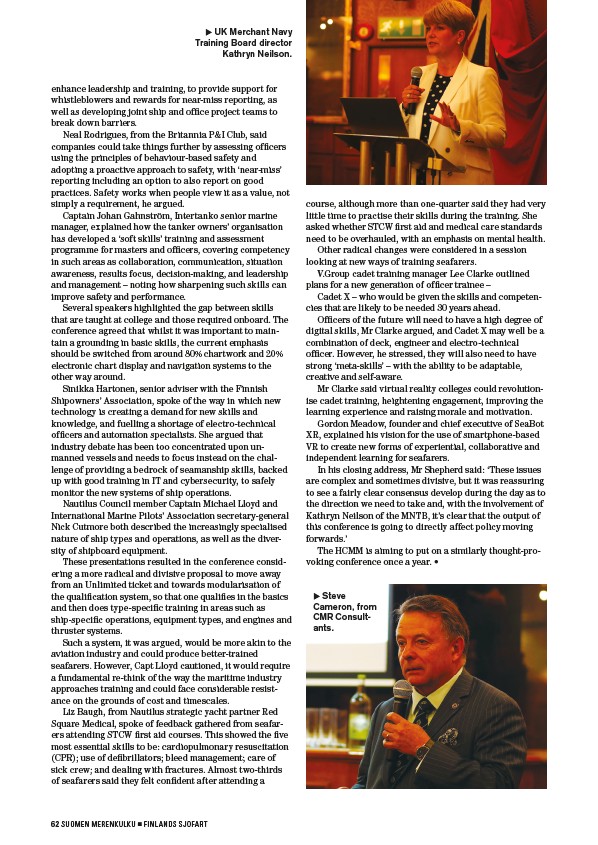
enhance leadership and training, to provide support for
whistleblowers and rewards for near-miss reporting, as
well as developing joint ship and office project teams to
break down barriers.
Neal Rodrigues, from the Britannia P&I Club, said
companies could take things further by assessing officers
using the principles of behaviour-based safety and
adopting a proactive approach to safety, with ‘near-miss’
reporting including an option to also report on good
practices. Safety works when people view it as a value, not
simply a requirement, he argued.
Captain Johan Gahnström, Intertanko senior marine
manager, explained how the tanker owners’ organisation
has developed a ‘soft skills’ training and assessment
programme for masters and officers, covering competency
in such areas as collaboration, communication, situation
awareness, results focus, decision-making, and leadership
and management – noting how sharpening such skills can
improve safety and performance.
Several speakers highlighted the gap between skills
that are taught at college and those required onboard. The
conference agreed that whilst it was important to main-tain
a grounding in basic skills, the current emphasis
should be switched from around 80% chartwork and 20%
electronic chart display and navigation systems to the
other way around.
Sinikka Hartonen, senior adviser with the Finnish
Shipowners’ Association, spoke of the way in which new
technology is creating a demand for new skills and
knowledge, and fuelling a shortage of electro-technical
officers and automation specialists. She argued that
industry debate has been too concentrated upon un-manned
vessels and needs to focus instead on the chal-lenge
of providing a bedrock of seamanship skills, backed
up with good training in IT and cybersecurity, to safely
monitor the new systems of ship operations.
Nautilus Council member Captain Michael Lloyd and
International Marine Pilots’ Association secretary-general
Nick Cutmore both described the increasingly specialised
nature of ship types and operations, as well as the diver-sity
of shipboard equipment.
These presentations resulted in the conference consid-ering
a more radical and divisive proposal to move away
from an Unlimited ticket and towards modularisation of
the qualification system, so that one qualifies in the basics
and then does type-specific training in areas such as
ship-specific operations, equipment types, and engines and
thruster systems.
Such a system, it was argued, would be more akin to the
aviation industry and could produce better-trained
seafarers. However, Capt Lloyd cautioned, it would require
a fundamental re-think of the way the maritime industry
approaches training and could face considerable resist-ance
on the grounds of cost and timescales.
Liz Baugh, from Nautilus strategic yacht partner Red
Square Medical, spoke of feedback gathered from seafar-ers
attending STCW first aid courses. This showed the five
most essential skills to be: cardiopulmonary resuscitation
(CPR); use of defibrillators; bleed management; care of
sick crew; and dealing with fractures. Almost two-thirds
of seafarers said they felt confident after attending a
62 SUOMEN MERENKULKU J FINLANDS SJÖFART
course, although more than one-quarter said they had very
little time to practise their skills during the training. She
asked whether STCW first aid and medical care standards
need to be overhauled, with an emphasis on mental health.
Other radical changes were considered in a session
looking at new ways of training seafarers.
V.Group cadet training manager Lee Clarke outlined
plans for a new generation of officer trainee –
Cadet X – who would be given the skills and competen-cies
that are likely to be needed 30 years ahead.
Officers of the future will need to have a high degree of
digital skills, Mr Clarke argued, and Cadet X may well be a
combination of deck, engineer and electro-technical
officer. However, he stressed, they will also need to have
strong ‘meta-skills’ – with the ability to be adaptable,
creative and self-aware.
Mr Clarke said virtual reality colleges could revolution-ise
cadet training, heightening engagement, improving the
learning experience and raising morale and motivation.
Gordon Meadow, founder and chief executive of SeaBot
XR, explained his vision for the use of smartphone-based
VR to create new forms of experiential, collaborative and
independent learning for seafarers.
In his closing address, Mr Shepherd said: ‘These issues
are complex and sometimes divisive, but it was reassuring
to see a fairly clear consensus develop during the day as to
the direction we need to take and, with the involvement of
Kathryn Neilson of the MNTB, it’s clear that the output of
this conference is going to directly affect policy moving
forwards.’
The HCMM is aiming to put on a similarly thought-pro-voking
conference once a year. •
E UK Merchant Navy
Training Board director
Kathryn Neilson.
E Steve
Cameron, from
CMR Consult-ants.